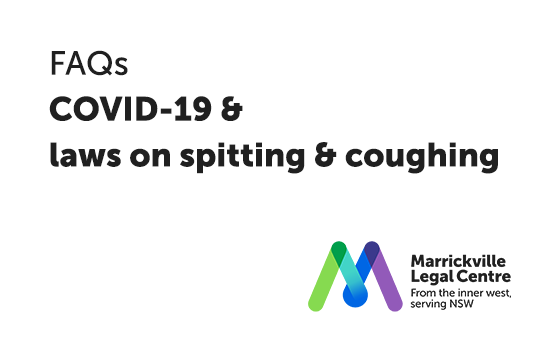COVID-19 & laws on spitting and coughing

Currently there are laws in force in New South Wales relating to spitting and coughing due to the COVID-19 pandemic[1]. Breaking these laws may result in very serious penalties.
The offence
It is an offence to intentionally spit at, or cough on, a public official or a worker while the worker is at the worker’s place of work or travelling to or from that place.
The spitting or coughing must also be done “in a way that would reasonably be likely to cause fear about the spread of COVID-19.”
Meaning of “worker”
“Worker” is very broad. Examples include:
- Retail workers;
- Bus, taxi and ride-share drivers;
- Food delivery workers; and
- Postal delivery staff.
Meaning of “public official”
For the purposes of the offence, a “public official” means:
- Health workers;
- Police officers;
- Immigration and border protection workers;
- Any person exercising public functions under NSW law – e.g. transport officers and council rangers; and
- People employed by the Commonwealth Department of Health.
Penalty [2]
If you commit an offence under these new provisions, you may be issued with an on-the-spot fine of $5,000. If the matter is dealt with by the Court, the Court may increase the penalty to $11,000 and record a conviction, or imprisonment for six months, or both.
Examples
Example 1
Q: John films a viral prank video by coughing on police officers, while saying he has COVID-19. Has John committed an offence?
A: Yes. This is an offence under the new laws. John has intentionally coughed on police officers, who are “public officials”. He has done so in a manner that would reasonably be likely to cause fear about the spread of COVID-19.
Example 2
Q: Mary is at hospital and has a coughing fit. She tries to cover her mouth using her elbow, but accidentally coughs on one of the nurses. Has Mary committed an offence?
A: No. Mary has not committed an offence because she did not intentionally cough on the nurse.
Example 3
Q: Robert and Ruby are in self-isolation after their housemate Mary tested positive for COVID-19. An altercation occurs in their home office where Ruby spits on Robert while he is in a Zoom meeting. Has Ruby committed an offence?
A: This is an offence under the new laws since Robert works from home and the home office is not used solely for residential purposes.
Existing offences involving spitting or coughing
You may also be committing an offence or civil wrong under existing laws for spitting or coughing.
Criminal
Spitting or coughing on someone may be a common assault under s 61 of the Crimes Act 1900 (NSW). It will be an offence if the coughing or spitting intentionally or recklessly causes another person to apprehend immediate and unlawful harm.
It is also an offence if there is an intentional or reckless application “of force” to another person. Spitting on another person, even if it only touches their clothes, is considered to be the application of “force” to another person[3].
The maximum penalty for common assault is 2 years’ imprisonment, a fine of $5,500 or both (when dealt with in the Local Court).
Civil
Spitting and coughing may also be a tort (a civil wrong against another person).
If you have received a penalty notice (i.e. a fine) or a Court Attendance Notice, please seek legal advice. It is very important to seek legal advice before electing to take a penalty notice to Court. Electing to take a penalty notice to Court can have very serious consequences.
